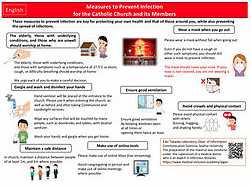The Last Judgement
(see: Matthew 25: 31-46) By: Fr. Günther Kerkmann, SJ
Every year in late November, we celebrate the last Sunday of the liturgical year. It mirrors the end of the world, or more closely to us, it mirrors the last day of our lives in this world. Therefore, the Parable of the Last Judgement is read on that Sunday.
The parable of the Last Judgement gives us a summary of what we should strive for, the criterion of a successful life, of what true happiness means.
But, there are a lot of difficulties to understand this parable. We find it difficult to accept a judging God, who even condemns people, who is so strict, so without mercy! The image of God as a judge contrasts very much with the image of the peaceful Buddha!
We don't want a strict God. We feel that we are supervised, controlled. We do not like a heavenly supervisor or policeman, who tries to catch us in the act. We revolt against such a God.
Sometimes this revolt also goes against the Church. The Church which gives us all kinds of commands, tries to control our lives, tries to tell us what to do.
We don't want such a God, and we do not want such a Church.
But all this is a tragic misunderstanding. Tragic, because it leads us away from God, from the Church, and even more important, it hinders us to find true happiness.
What does this parable really tell us?
First of all, we have to realize that it is a parable, a story to explain something. The story of the strict judge is but a picture. It is not reality.
What Jesus wants to say is, that God invites us to true happiness, and he wants to show us the way to a fulfilled life. The way to a fulfilled life is not an egocentric isolation, but a life for and with others, a life of true Love.
If you do not like the image of the strict judge, try another image, for example, the image of the glass wall. Whenever we commit a sin, whenever we act selfishly, we build a wall between us and our fellow human beings, between us and God. One glass block after another. I call them glass blocks, because we see our neighbor who is suffering, who is in trouble, who is lonely, on the other side, but the glass bricks we pile up between him and us, hinder us to go to him, to help.
We see the splendor and beauty of God on the other side, we want to go to Him, but like an insect we bump against the glass wall we have built ourselves. This is hell. But please note: It is not God who condemns us, it is ourselves who build the glass wall. But this glass wall can melt with every act of love, with every act of repentance, with every act of generosity.
Jesus wants to say, the Kingdom of God is not something esoteric, not something difficult. Just lead a life for others and with others. Make it concrete: give food to the hungry and drink to the thirsty, visit those who are lonely, and so on.
What is a fulfilled life? Jesus answers with this parable. He says, "At the end of your life, you will not be asked how much money you have made; you will not be asked what titles you have; or how big the company was you worked for; or what university you graduated from.
You will be asked only one question:
How much have you loved in a concrete way?
Only that? you may ask. Yes, only that. And it is quite enough.
Let me illustrate this with a poem:
Hands of God
God has no other eyes but yours
to see the suffering in this world.
God has no other ears but yours
to listen to the troubles of this world.
God has no other lips but yours,
to speak words of hope to this world.
God has no other feet but yours
to walk the path of peace in this world.
God has no other hands but yours
to bring help and healing to this world.
God has no other heart but yours
to love this world.

 ENGLISH
ENGLISH  ESPAÑOL
ESPAÑOL 







